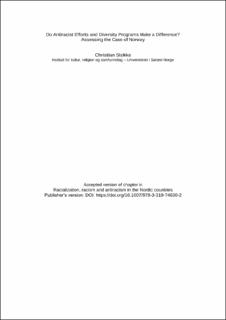Do Antiracist Efforts and Diversity Programs Make a Difference? Assessing the Case of Norway
Chapter
Accepted version
Permanent lenke
https://hdl.handle.net/11250/2678830Utgivelsesdato
2019Metadata
Vis full innførselSamlinger
Originalversjon
Stokke, C. (2019). Do Antiracist Efforts and Diversity Programs Make a Difference? Assessing the Case of Norway. In P. Hervik (red.), Racialization, racism and antiracism in the Nordic countries (s. 205-228). London: Palgrave Macmillan. https://doi.org/10.1007/978-3-319-74630-2_9Sammendrag
This chapter discusses multicultural developments in Norway over the last decade, in public debate, policy, and education, and assesses if antiracist efforts and diversity programs make a difference. The chapter uses two empirical cases from public debate, the cartoon affair and hijab debates, to analyze Norwegian Muslims’ mobilization in street protest and mediated public debate. I theorize multiculturalism and antiracism as social movements and the state’s partial accommodation of their demands in policy and law—a model that fits Scandinavian social democracy. Norwegian Muslims emphasize that Islam supports free speech and gender equality but want to be equal partners in negotiating and interpreting these values. They argue that free speech does not justify anti-Muslim racism, and Muslim women want to define their own Muslim feminism. Analysis shows that the dialogue-oriented social democratic government’s (2005–2013) diversity policy accommodated many minority perspectives and made multicultural education a priority in schools, opening a space for antiracist education. I argue that real integration requires that the majority learns to recognize minority perspectives, develop empathy, and take racism seriously.
